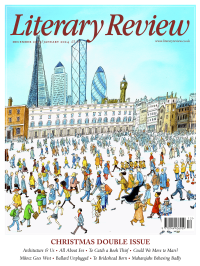Jonathan Rée
A Martian in Oxford
J L Austin: Philosopher and D-Day Intelligence Officer M W Rowe
By M W Rowe
Oxford University Press 645pp £30
The Normandy landings of June 1944 owed their success not only to the size and strength of the Allied forces, but also to the work of a little-known unit of the British army known as the Theatre Intelligence Service (TIS). From modest beginnings three years before, the TIS had evolved into a team of around three hundred investigators poring over maps, guidebooks, postcards and newspapers as well as Bletchley Park intercepts, aerial photographs and messages brought by carrier pigeons from occupied France. The TIS started issuing confidential weekly reports in 1942, and by 1944 it was ready with dozens of maps, plans and commentaries showing the condition of French beaches, the identities and attitudes of local politicians and the disposition of German forces to a depth of thirty miles. As D-day approached, it supplied essential intelligence not only to Supreme Headquarters but also, in thousands of copies, to troops as they went into action.
The TIS was an element in an enormous military machine, but it was also self-consciously unconventional: its members referred to themselves as Martians, their weekly dispatches were called Martian Reports and their invasion handbooks bore the skittish title Invade Mecum. The unit was, as M W Rowe puts it, a

Sign Up to our newsletter
Receive free articles, highlights from the archive, news, details of prizes, and much more.@Lit_Review
Follow Literary Review on Twitter
Twitter Feed
Literary Review is seeking an editorial intern.
Though Jean-Michel Basquiat was a sensation in his lifetime, it was thirty years after his death that one of his pieces fetched a record price of $110.5 million.
Stephen Smith explores the artist's starry afterlife.
Stephen Smith - Paint Fast, Die Young
Stephen Smith: Paint Fast, Die Young - Jean-Michel Basquiat: The Making of an Icon by Doug Woodham
literaryreview.co.uk
15th-century news transmission was a slow business, reliant on horses and ships. As the centuries passed, though, mass newspapers and faster transport sped things up.
John Adamson examines how this evolution changed Europe.
John Adamson - Hold the Front Page
John Adamson: Hold the Front Page - The Great Exchange: Making the News in Early Modern Europe by Joad Raymond Wren
literaryreview.co.uk